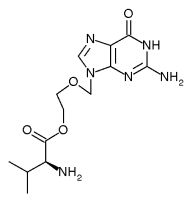Infection with genital herpes simplex virus (HSV) causes significant morbidity for millions of infected persons. Without therapy, more than 90 percent of patients experience clinical recurrences, but a decade of experience has demonstrated that daily suppressive therapy with acyclovir, in a dosage of 400 mg twice daily, is effective and is well-tolerated by patients. Reitano and colleagues conducted a placebo-controlled study to compare this regimen with a range of once-daily dosages of valaciclovir in immunocompetent adults.
A total of 1,479 patients with documented HSV infection were selected tot the study. The patients must have had at least six clinical episodes of HSV per year and been free of significant hepatic or renal disease. After screening, patients were randomly assigned to one of six treatment groups. Treatment consisted of valaciclovir: 250 mg once daily, 500 mg daily, 250 mg twice daily or 1 g daily; acyclovir: 400 mg twice daily; or placebo. Treatment continued lot one year, with patients returning to the clinic monthly. Patients were instructed to contact the clinic within 24 hours of onset of a clinical recurrence of HSV infection, Hematology and clinical chemistry parameters were monitored at enrollment, at six months and after one year of therapy. Plasma acyclovir levels were determined at three, six, nine and 12 months. Patients kept diaries throughout the study to monitor adverse effects, clinical recurrences and use of other medications.
The full protocol was completed by 1,050 patients (71 percent). The most common reason for not completing the protocol was loss to follow-up (9.2 percent). Five percent of patients reported adverse experiences as a reason for discontinuing the study. The proportions of recurrence-free patients at one year were 50 percent in the group taking 250 mg of valaciclovir twice daily; 48 percent in the group taking 1 g of valaciclovir once daily; 49 percent in the group taking 400 mg of acyclovir twice daily; and 40 percent in the group taking 500 nag of valaciclovir once daily. In patients who were taking 230 mg of valaciclovir once daily, the proportion of nonrecurrence fell to 22 percent. In the group taking placebo, the recurrence-free rate was 5 percent. Three regimens, valaciclovir at 250 mg twice daily,, valaciclovir at 1 g daily and acyclovir at 400 mg twice daily, reduced the recurrence rate by 78 to 79 percent. Valaciclovir in a dosage of 500 mg once daily was associated with a reduction of 71 percent. The 250-mg daily dosage of valaciclovir reduced recurrence by 54 percent compared with placebo. The safety profiles of all treatments were comparable.
After an analysis of subgroups, the authors concluded that valaciclovir, in a dosage of 500 mg once daily, effectively treated patients with a history of up to 10 HSV recurrences per year. In patients with a history of 10 or more recurrences per year, the most effective daily regimens were valaciclovir in a dosage of 1 g daily or 250 mg twice daily, and acyclovir in a dosage of 400 mg twice daily.
Reitano M, et al. Valaciclovir for the suppression of recurrent genital herpes simplex virus infection: a large-scale close range-finding study. J infect Dis September 1998;178:603-10.
COPYRIGHT 1999 American Academy of Family Physicians
COPYRIGHT 2000 Gale Group



